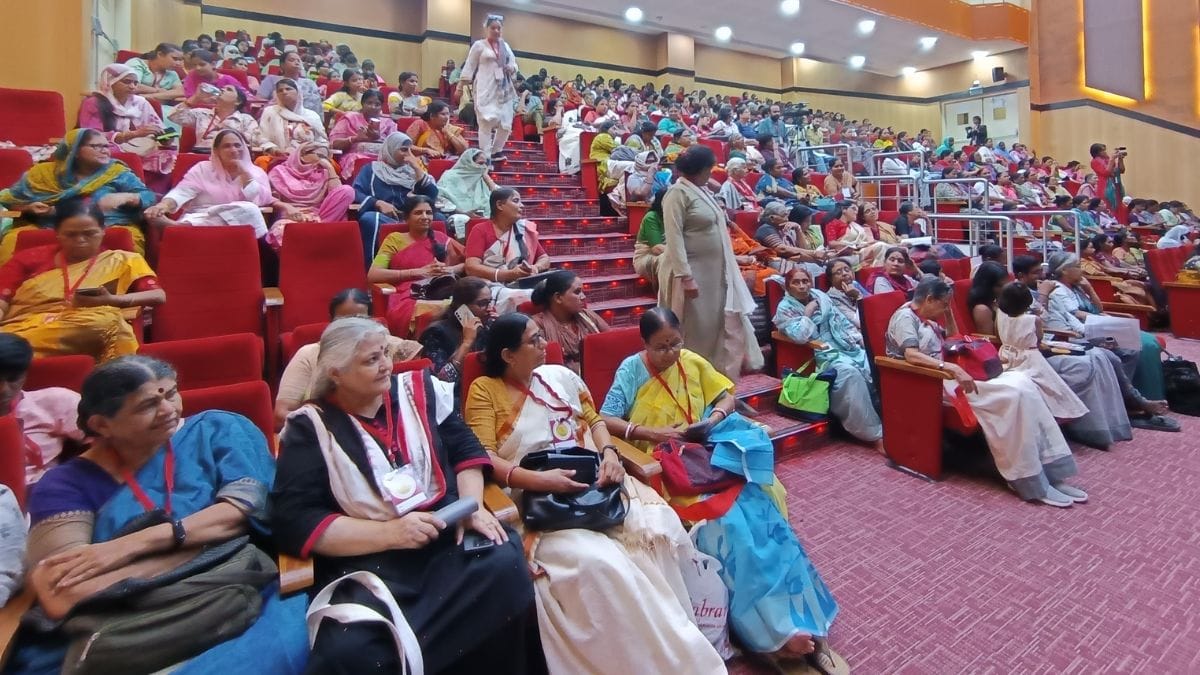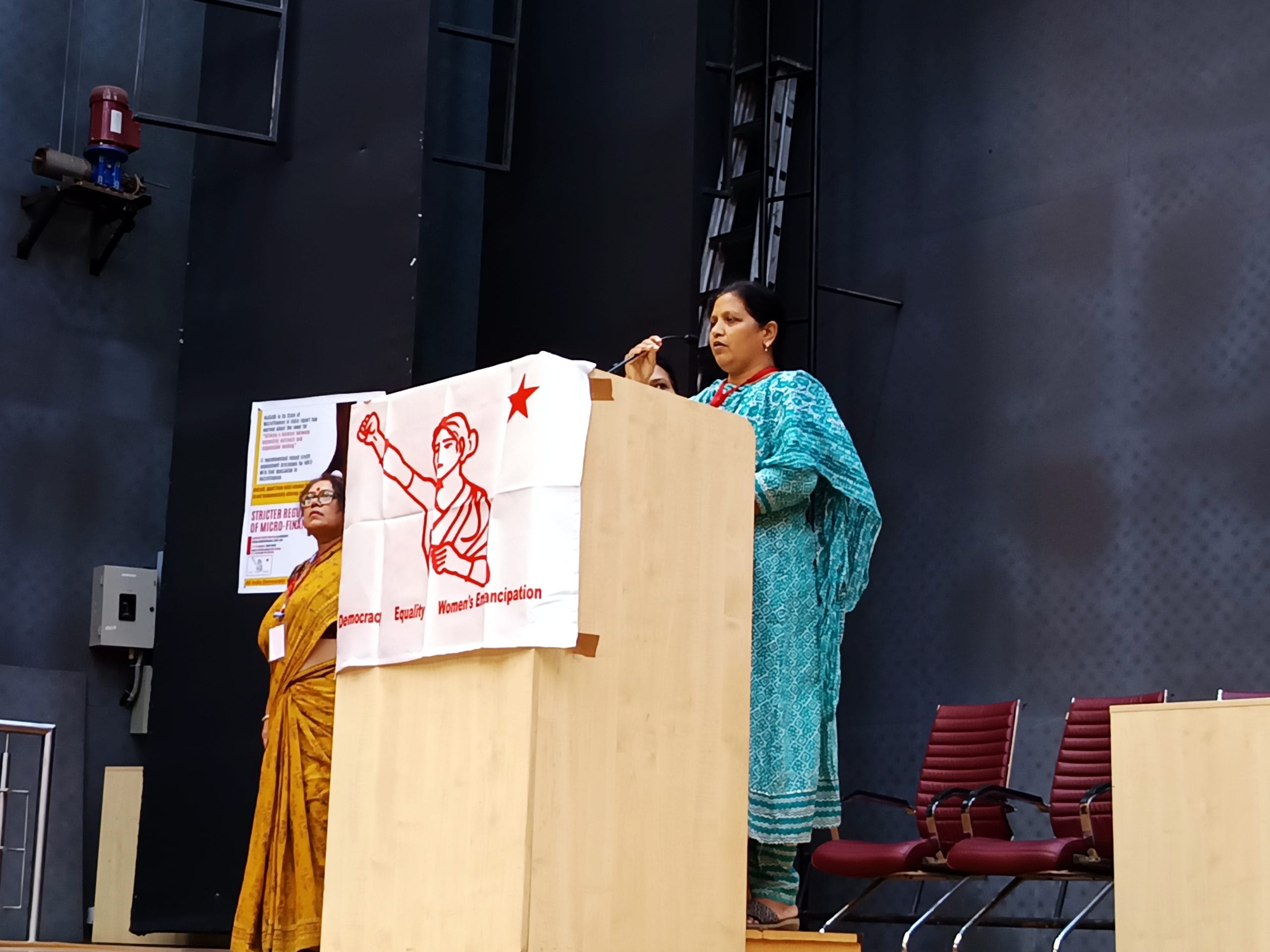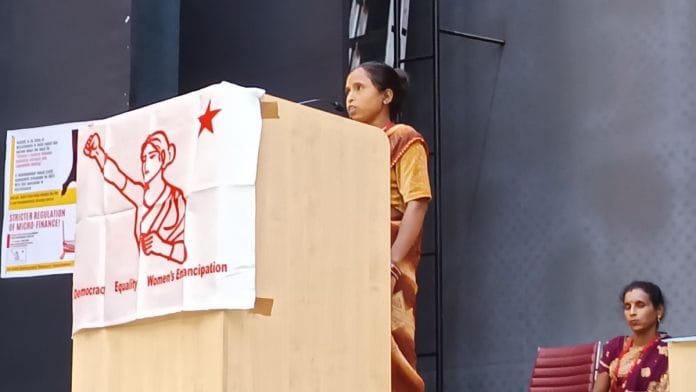New Delhi: In her 30s and from a low-income background, Pooja Verma, along with her husband, travelled over 473 km from Jhansi to Delhi, carrying her eight-month-old baby. In the heart of the Capital, a short distance from Parliament, she joined hundreds of women for a public meeting on the alleged exploitation of women by microfinance companies (MFIs), non-banking financial companies (NBFCs), and private banks who they accused of luring them with easy loans, at incredibly high interest.
In the 23-24 August public hearing organised by the All India Democratic Women’s Association (AIDWA) at ITO’s Harkishan Singh Surjeet Bhawan, women from across the country blamed private sector institutions for their rising indebtedness. They also accused the governments and the Reserve Bank of India (RBI) of failing to regulate the private banking sector, curbing malpractices and shielding them from exploitation.
The charges, according to AIDWA general secretary Mariam Dhawale, are grounded on a survey, which covered 9,000 women borrowers across 21 states and 100 districts, and found that these women, once lured into taking loans from private players, fell into a debt trap due to the high interest rates.
More exploitation followed. “Women borrowers face harassment, displacement, loss of property, and sometimes, are driven to suicide by debt traps these organisations set,” AIDWA’s Dhawale said. She added that the reduced public spending on education, health, and employment is forcing women to take loans, but private banking, promoted but mostly unregulated, had added to the economic distress these women face.

“The NBFCs-MFIs and private banks are responsible for the verbal and physical abuse and increasing instances of suicides,” added Dhawale.
ThePrint reached Bharat Financial Inclusion Limited, formerly known as SKS Microfinance, —a private institutions that the women accused of exploiting them—via phone calls and emails but had not received any response. This article will be updated if and when a response is received.
From loans to harassment
In a brown and black striped saree, a hesitant Pooja Verma stood on the dais, microphone in hand, and began narrating her story to a hall packed with women and activists.
A few years ago, Pooja’s husband started driving an e-rickshaw, and after some time, she took a Rs 40,000 loan from IIFL Samasta Finance Limited to repair it. During the loan repayment, of the 24 instalments she needed to cover, she paid 11. The private lender, however, recorded only nine, Pooja rued.
One morning, recovery agents allegedly turned up at her house when she was alone at home with her children and mother-in-law and pressured Pooja into repaying that month’s repayment until noon. When Pooja said she did not know where her husband was, the agents allegedly started harassing her mother-in-law.
When her husband returned, the agents told the couple to visit the local branch along with them to resolve the matter, she said. Adding, “We went and they held us hostage in the bank for five hours and told my husband on a call, ‘Get the money and take your wife’.”
Firmly grasping the microphone in the hall, Pooja continued her story, saying that despite their promise to repay as soon as possible, the company officials did not let the couple leave.
“Maine unse kaha ki humein jane diya jaye lekin unhone kaha ki hum tumhe rassi de dete hain, samne wale kamre mein ja kar phansi laga lo, hum tumhare beema ke paison se apna paisa le lenge (I asked them to let us go, but they said, ‘We’ll give you a rope, go to the next room and hang yourself, we will take the money from your insurance’.”
Pooja’s story stunned everyone in the hall. Women murmured, with their sighs of distress audible across the room, and shook their heads in sorrow. “These microfinance institutions create a lot of pressure to deposit the loan amount. I suffered a lot of mental and physical torture,” Pooja concluded.
Highlighting the harassment by the police and their alleged collusion with the private lender, she added that her husband, thinking the police could do something, called them for help.
The police arrived soon but took them to Jhansi’s Moth police station. There, according to Pooja, the police and company agents got together and allegedly forced the couple to sign a blank paper, which they used to file claims that the couple lied to defame the private lender and visited its premises voluntarily, as instructed by the police.
After their release, a police officer returned them to their house in the night, and while on the way, set conditions for them to completely repay the loan by 2.30 am, threatening to implicate them, using the signed blank paper, if the couple were to file a complaint.
In an email response to ThePrint, IIFL Samasta Finance Ltd denied the allegations of Pooja Verma, calling them “false, baseless, and misleading.”
The company said it neither operates through agents nor agencies and has a dedicated grievance redressal system where complaints are resolved promptly and reviewed independently.
Referring to the Jhansi case, IIFL Samasta claimed that the police investigation found the allegations and the complaint to be baseless and unsubstantiated.
The Jhansi Police issued a formal statement exonerating it of “any wrongdoing,” the company said. “The aforesaid complainant had also submitted written statements withdrawing her complaints and confirming that no such incident occurred and the compliant was made in error.”
IIFL Samasta further stated that the Uttar Pradesh Microfinance Association did an independent inquiry and gave a clean chit to it.
The company emphasized that it strictly adheres to all RBI guidelines, including those relating to customer grievance redressal, ethical recovery practices, and fair treatment of borrowers. It said that its collection processes ensure transparency, fairness, and respect for the dignity of every customer.
Meanwhile, more than a dozen women shared similar stories at the public hearing. Physical, mental, sexual, and financial abuse, along with domestic violence and lack of employment, have pushed the women into a bottomless abyss.
Ayesha Nadaf from Sangli, Maharashtra, said, “I fell into a debt trap”.

It happened after she took her first loan out from SKS Microfinance. When the business she invested in failed, she borrowed from other institutions, such as ‘Gramin Kuta’, Ek Vikas, Ashirwad, and Gram Shakti, to repay her loans. It did not take much time for her to end up with a total loan of Rs 15 lakh.
With no steady income, repayment became impossible. Besides the constant pressure of repayment, she struggled to manage household expenses and her children’s education.
Company officials allegedly harassed her for missed instalments, and relatives and moneylenders she turned to for help abused her. “One moneylender started sexually harassing me by asking me to spend a night with him,” Nadaf said, tears in her eyes. “He told me, ‘Come with me for one night. You won’t have to pay the interest of that month, if you favour me like this.’”
Nadaf shared that she had taken a loan to run her household, but her husband abandoned her, telling her to “go to others” to repay it. Left alone with two daughters and a son, she had to endure the abuse and harassment of lenders. Hoping to escape the pressure, she remarried with her children’s consent, but her second husband also refused to repay the debt and deserted her. She still owes Rs 2 lakh to lenders.
Hailing from the East Burdwan district in West Bengal, Kalpana Roy (48), who took a Rs 2.5 lakh loan, demanded that the central and state governments ensure women receive the Mahatma Gandhi National Rural Employment Guarantee Act (MNREGA) cards and employment, besides reducing the interest rates on loans.
She shared how, once, the moneylenders allegedly barged into her home, stayed the entire day, and physically assaulted her and her family.
Demands by AIDWA, women
AIDWA has presented 22 demands to the government and the RBI, such as setting up grievance redressal mechanisms and fast-tracking Lok Adalats, stopping fund transfers from public sector banks to NBFCs-MFIs, creating a women’s cell in every public sector bank branch, reviving the agricultural gold subvention scheme, and increasing budgetary spending on social sector programmes to address the root causes of indebtedness.
They also demanded a centrally sponsored microfinance guarantee scheme—the maximum interest on loans is four percent, and the government covers the rest.
“This demand is justified because the government is giving loans of over Rs 100 crore—at less than five percent interest—to 424 private corporate institutions. It has also waived corporate loans worth more than Rs 16 lakh crore. So, it is not that the government lacks funds to guarantee women’s loans,” said Dhawale.
On the other hand, they demanded a microfinance fund to provide special assistance and compensation to the families of women who, troubled by debt, died by suicide.
Seeking reforms, AIDWA called for a law to develop and ensure women’s right to credit, in wide consultation with women’s organisations, self-help groups, and trade unions.
“If banks give loans with respect, they should also ask for its repayment with respect. I am not refusing to pay, but once our dignity is lost, who will restore it?” said Ayesha Nadaf.
This is an updated verson of the article with response from IIFL Samasta Finance Ltd.
(Edited by Madhurita Goswami)






